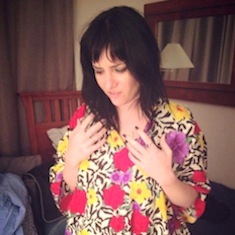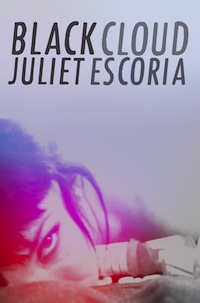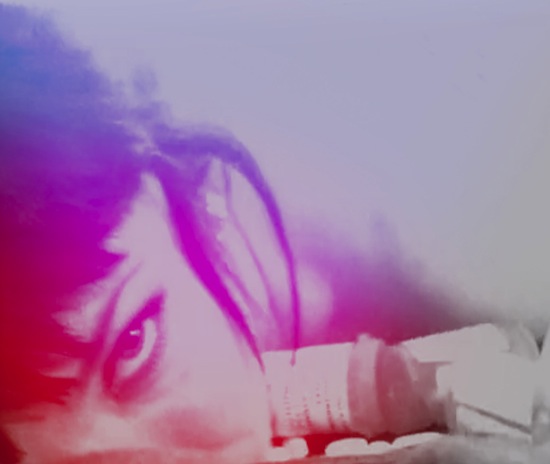I first met Juliet Escoria at a reading in 2011. The bookstore we did the reading at was small and claustrophobic and I had to keep walking outside because I felt like I was going to pass out. I remember Escoria’s wild eyes and that her reading was sharp and tight. I sold her one of my books after the reading and she gave me the money. I think I asked her for five dollars, but I didn’t realize until after she left that she had only given me four. Fuck. I couldn’t make change for the rest of the night.
Years later I told her that story and she sent me a dollar in the mail. It was all a simple mistake, but I wanted to think that it wasn’t. I wanted to think she did it on purpose. I wanted to think of her being dangerous and untameable and if she was stiffing me for a dollar — then it was hard to tell what other questionable pursuits she was up to. I wanted her to be one of "the pure products of America" going crazy and wild. And Escoria’s prose is wild.
Of course, I always hate literary or geographical references when one is talking about a writer’s work, but I think these stories feel very Californian to me (whatever the hell that means). Not the Beach Boys California or even the California of Robert Towne, but the California of the Zodiac killer and the Night Stalker. It’s a voice like a young Didion would have had if Didion had only spent time cutting herself as a teenager and spending time in hospitals.
So Black Cloud is coming out in April from Civil Coping Mechanisms and it’s about the secret things no one ever talks about or hides beneath something literary. It’s a book structured around emotions like guilt and apathy and it’s above all a book that feels so brave it could get someone fired. The stories are full of diamond-hard sentences and quick little story punches. There is something about the stories that feel detached and separate but at the same time there is a warmth to the voice: a narrator’s mother appears in the same story as an abortion, and there is a tenderness expressed towards a boyfriend’s ex-girlfriend who has passed away. Perhaps this is even an obsession. Perhaps this is even a haunting with Escoria. Maybe that’s what I love about the book the most. It feels like it’s a ghost book and the biggest ghost of all is Escoria herself.
I interviewed Escoria about Black Cloud and writing next to a river and at an apartment that we’ll soon share together. This is what she said. Warning: I obviously have no clue how to conduct an interview.
What is Black Cloud?
Juliet Escoria: It’s a book.
You are correct. You answered the question right. What is it though?
JE: It’s a book of short stories. You read it. I wrote it. I feel like I’m a little too close to it to be objective.
It’s a book of short stories, with a bunch of ex-boyfriends in it. And drugs.
JE: Good answer.
I heard you say earlier today, "That person would be a better writer if they were more attractive." What does that mean?
JE: Who did I say that about? I can’t remember. I was probably just being catty on purpose.
But there is a certain amount of truth in that line of thinking, although I think its trueness depends on the writer. Like, being a writer is not just your words – it’s who you are and how you live, which is probably why boring people tend to be boring writers. If you think it doesn’t work this way, then you’re being stupid.
Joyce’s writing, for example, would not be the same if he was a great guy. Bukowski wouldn’t have done what he had done if he was handsome. Some writers – some artists, especially musicians and obviously actors – need to be good looking, and for others, it just doesn’t serve their art. What if Gertrude Stein was a babe?
For most women writers, I think the optimum level of attractiveness is at least a 7 but definitely no more than a 9. For most male writers, I think they should be between a 6 and a 7, because it’s more difficult to take a pretty man seriously than a pretty woman. I feel like a lot of people would think I am being shallow and/or sexist here, and in some ways I am. But that’s how people are. We’re all judgmental and we are all often shallow, and if you think you aren’t then you’re delusional and full of shit.
Do you think attractiveness has more to do with your outlook on life than race or gender?
JE: I don’t know about outlook on life. But maybe it does have something to do with how the world looks at me. I’ve noticed that if I go out in public with my hair done and wearing a full face of make-up, strangers are always nicer to me. I’ve also gotten jobs where it wouldn’t have mattered if I was a different race or gay or male, but it would have mattered if I was unattractive. The whole service industry in big cities like New York and LA is based on that, yet there are no laws about discriminating because of attractiveness. Maybe people need to start getting worked up on that instead – the oppression of ugly people. Or maybe I’m being totally ridiculous, I don’t know. I can say, however, that being attractive and white and female really helps in terms of not getting a DUI.
When was your closest time to getting a DUI?
JE: There have been more than one, but probably the closest was the time that I got pulled over for a broken tail light. I was drunk but not shitfaced, and I had a bottle of hard cider in the cup holder because it was hard cider, and I didn’t consider hard cider to really be alcohol. I put it at my boyfriend-at-the-time’s feet, but he kicked it over because he was really drunk. It made the car smell like alcohol, except the cops thought the smell was coming from him because he was acting so drunk, and I, on the other hand, was acting sweet. They had me get out of the car and do the field sobriety test, which I passed because I used to practice that. Then someone ran the red light so they let me go.

Why did you do videos for Black Cloud? Aren’t the stories enough?
JE: I grew up watching MTV, back when it still played music videos. I always watched them and thought about what I would do differently if I were making the video. I always felt a little bit jealous of musicians because they can make music videos. So then I got this idea about making music videos, but for stories.
But it also had to do with desperation. I was sick of writing things and having nobody care about them. I knew I was better than 90% of writers out there, but I didn’t know how to get other people to figure that out. Videos seemed like a good way, because doing one for each story in a collection is a ridiculous thing to do, and therefore no one else had done it yet. And it’s easier to get people to watch a three-minute video than read a story in a literary magazine. Also because of what we talked about earlier. The video that has gotten the most plays the first couple days is ‘Fuck California’; the thumbnail for that video is me and my best friend wearing a bra and underwear with fake blood on us.
The book was originally called Drugs & Boys. Why’d you change it?
JE: That title is annoying as shit. I never really liked it, I just figured it would be hard to ignore. Like if I was an editor of a publishing house, I felt like I would want to read that book. It was also kind of a joke. Like, What’s your book called? Drugs & Boys. What’s it about? Dairy farming.
What do you know about dairy farming?
JE: Not anything.
What a cop out. Why did you do your blurbs like that? Are you a masochist?
JE: I sent out a couple of request for blurbs from two of my professors at my MFA program. It made me feel really disgusting, like I immediately wished I hadn’t sent the emails. One of the teachers, who had been an advisor of mine, ignored the email completely. The other teacher took a long time to write back and then said she didn’t blurb students “for obvious reasons,” which made me wish I had gone to Columbia or CUNY Hunter, because those programs blurb their students all the time. Maybe they both just really hated my writing. Maybe they didn’t want to blurb me because CCM is a small press. Maybe they don’t have a lot of free time and writing blurbs is hard.
Anyway. It made me feel really shitty, and I figured it would be more interesting and less gross if I asked people to insult me instead. The whole blurb thing is such bullshit.
Is your narrator the same person in all the stories?
JE: I don’t know. Is yours?
Who cares?
JE: Exactly.
What do you think you smell like?
JE: I used to have one overarching scent, which was cigarettes, but I quit smoking four months ago. Now I think I have two: there’s private Juliet, the one who doesn’t leave the house, which smells like body odor, dirty hair, old sweat, and stank-ass pussy. Then there’s public Juliet, which smells like lotion, deodorant, hair product, perfume, and stank-ass pussy. That’s a trait of great female writers, by the way. Stank-ass pussy. Just ask Joan Didion.
My mother is really not going to like the way I answered that question.

Black Cloud is published April 2014, by Civil Coping Mechanisms. Scott McClanahan’s Hill William is published by Tyrant Books


